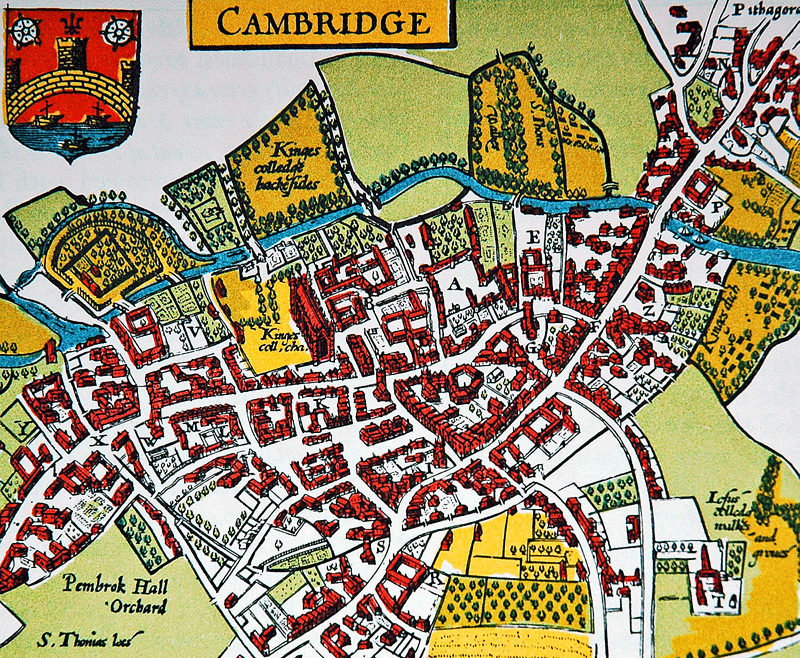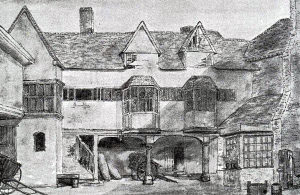The Court of Chivalry 1634-1640.
This free content was Born digital. CC-NC-BY.
Richard Cust, Andrew Hopper, '627 Story v Ranew', in The Court of Chivalry 1634-1640, ed. Richard Cust, Andrew Hopper , British History Online https://www.british-history.ac.uk/no-series/court-of-chivalry/627-story-ranew [accessed 1 May 2025].
Richard Cust, Andrew Hopper, '627 Story v Ranew', in The Court of Chivalry 1634-1640. Edited by Richard Cust, Andrew Hopper , British History Online, accessed May 1, 2025, https://www.british-history.ac.uk/no-series/court-of-chivalry/627-story-ranew.
Richard Cust, Andrew Hopper. "627 Story v Ranew". The Court of Chivalry 1634-1640. Ed. Richard Cust, Andrew Hopper , British History Online. Web. 1 May 2025. https://www.british-history.ac.uk/no-series/court-of-chivalry/627-story-ranew.
In this section
627 STORY V RANEW
Philip Story of Chesterton, co. Cambridge, gent v Alexander Ranew of the same, husbandman
January 1636 - June 1637

Early Stuart Cambridge. Philip Story's witnesses were examined at the Bear Inn in April 1636 (From, John Speed, Theatre of the Empire of Great Britain (1611))

The rear of the Bear Inn, Cambridge, where commissioners met in April 1636.
Abstract
Story, a chief constable, complained that at a rating for ship money at the house of Thomas Atkinson, constable, in Chesterton, Cambridgeshire, in September 1635, Ranew had called him a 'coxcombe' or 'fool', and said that 'there were none but fooles and knaves that were at the rate making.' Previously, around midsummer 1635, after some dogfighting in the streets at Chesterton, Story's wife, Susan, had called Ranew 'an old rotten stinking knave', to which Ranew replied that 'she was a dunghill gentlewoman and brought upp in a hogstye or thereabouts.' Story had Ranew summoned to appear at the Cambridgeshire quarter sessions on 9 January 1636, but did not appear to prosecute the cause and proceeded instead at the Court of Chivalry. He presented his libel on 20 February 1636 and his witnesses were examined by commissioners Talbot Pepys, esq, and John Sterne, and William Bridge, gents, on 5 April 1636 at the Bear Inn, Cambridge. Their evidence demonstrated that Story had been described as a gentleman since the death of his father, Robert, four years earlier. Robert had been a maltster and high constable of Chesterton hundred for twenty years, and, in spite of bearing no coat of arms, 'was reputed a gentleman by his place.' Dr Eden began the defence in May 1636 and was due to present his witnesses' depositions in February 1637. The case continued until June, but no indication of sentence survives.
Initial proceedings
EM49, Libel [fragment]
Recited that Ranew had also spoken scandalous words against Susanna, daughter of Alexander Ekims of Molesworth, co. Huntingdon, and 'that none but knaves and fooles were at the rate'.
Endorsed on 20 February 1636.
Signed by Arthur Duck.
EM48, Certificate of Cambridgeshire Justices
Alexander Ranew was brought before the justices of the peace at Cambridge quarter sessions on 9 January 1636, in execution of a justice of the peace's warrant, where he was to appear before the rest of the justices and abide by the order of the sessions. Certified that Ranew had used words against Philip Storie, a chief constable at a meeting for the making of a rate for ship money: 'Philip Storie was a Coxcombe, or is a coxcombe or fool or to that effect.'
Ranew was bound to appear at next sessions and to be of good behaviour in the meantime. But Philip Storie did not attend to prosecute the cause when called to do so by the 'crier of the court', so Ranew was released upon being bound to good behaviour.
Sigs: Thomas Bainbrigg, D.D., Isaac Barrow, esq., Robert Lukyn, esq., and Thomas Tyrrell, esq.
No date
EM50, Certificate of Ship Money Assessors
Certified that Story did not prosecute Ranew at the Cambidgeshire Sessions for disgraceful words, but that Ranew was complained of by the signatories for scandalous and abusive words spoken against them 'wee being sessors of his Majesties Shipp Money'.
Signed by John Stern, Joseph Ransom, Thomas Adkinson and Henry Pecocke.
No date
EM3671a, Letters commissory for the plaintiff
To Talbot Pepys and William Lysle, esqs and John Sterne, and William Bridge gents at the Beare Inn, Cambridge.
5 April 1636
EM3671b, Plaintiff depositions
Taken before Talbot Pepys, esq., and John Sterne, and William Bridge, gents., at the Beare Inn, Cambridge on 5 April 1636, with James Tabor, notary
(Witness 1) Henry Pecocke of Chesterton, co. Cambridge, maltster, aged 60
He had known Philip Story for 20 years and had known his late father, Robert Story for 30 years, who for all that time was called Mr Story and was a maltster and high constable of Chesterton hundred, 'and amongst his neighbours there was accompted and reputed a gentleman'. During the last four years since the death of his father, Philip Story had been called Mr Story 'and accompted and reputed for a gentleman'. He did not know whether Robert Story bore arms. Three years ago Philip Story married Susan Ekins the daughter of Alexander Ekins; and Alexander Ekins had for the past 40 years been 'called Mr Ekyns and accompted amongst the most ancient stock of the yeomandrye in Northamptonshire and a grand jury man there, but knoweth not whither Mr Ekyns aforesaid doth beare any coate of armes.' He had known Alexander Ranew for 30 years; and for all that time had known him 'to be a husbandman and soe commonly reputed and taken amongst his neighbours'.
In September 1635, Philip Story and others were appointed to rate and tax the inhabitants of Chesterton for ship money. After the rate was made he heard Alexander Ranew in the house of Thomas Atkinson, one of the constables of Chesterton, say 'there were none but fooles and knaves that were at the rate making, that knewe not how to make a rate'. There were present when the words were spoken 'Richard Wallys, Hatton Phipers, Thomas Atkinson and his wife, William Allen and others'. By these words Pecocke understood Ranew to mean 'that Philip Storye '(who was one of those that made the rate) was a knave and a foole'.
(Witness 2) Thomas Atkynson of Chesterton, maltster, aged 40
He had known Robert Story for about 6 years before his death, 'but knoweth not whither Robert Story was borne and descended of the stock of a gentleman but saith that Robert Story was reputed a gentleman by his place, he being an high constable.' And for 10 or 11 years last past Alexander Raynew 'hath bein commonly called goodman Raynew.'
In September 1635 after Philip Story had made the ship money rate, Alexander Raynew came into his house in Chesterton and desired to see the rate whereupon 'finding himself greived, said there were none but fooles and knaves that were at the rate makinge'.
(Witness 3) George Fromont of Chesterton, co. Cambridge, labourer, aged 40
'A little after midsomer last past, he John Bleake and some others, being together in Chesterton, and in the street there a little beyond the vine there, he saw that Philip Storye, his wife Susan and Alexander Raynew 'were at some words about the dogge fightinge in the streets and did there heare Susan Story tell Alexander Raynew that he was 'an old rotten stinking knave' to which Alexander Raynew replied 'that she did not shew herselfe a gentlewoman in that, but a dunghill gentlewoman and brought up in a hoggs coate or hard by'.
(Witness 4) Stephen Colvile of Chesterton, co. Cambridge, aged 23
Remembered that 'there were doggs fighting in the street of Chesterton by the vine side there, and after the doggs were parted, he being in Raynew's house, heard Alexander Raynew who was then in the street say to Susan Storey that she was a dunghill gentlewoman and brought upp in a hogstye or thereabouts'.
Signed by Pepys, Stern and Bridge and the notary James Tabor.
Sentence / Arbitration
EM3151, Defendant's bill of costs
Account of Ranew's costs:
Hilary term, 1635 - Trinity term, 1637: £26-10s-0d
Summary of proceedings
Dr Duck acted as counsel for Story and Dr Eden for Raynew. On 7 May 1636 the commissioners were required to send the court their examinations of Story's witnesses. On 28 May Dr Eden was required to give material for the defence. On 15 June Dr Eden petitioned that his material for the defence might be admitted. On 28 January 1637 the court moved to examine the witnesses for the defence. Dr Eden was to introduce the commission within 6 days and to publish the witnesses' depositions. On 11 February the court moved to hear sentence at the first session of the next term and the testimony of the witnesses was published five days later.
Notes
Neither Philip Story nor Alexander Raynew appear in the Visitation of 1619, but the son and heir of Philip Story of Chesterton, another Philip Story, attended Trinity College, Cambridge in 1652 and Gray's Inn in 1655.
J. W. Clay (ed.), The Visitations of Cambridge, 1575 and 1619 (Publications of the Harleian Society, 41, 1897); J. and J. A. Venn (eds.), Alumni Cantabrigienses from the earliest times to 1751 (Cambridge, 1922), vol. 1, p. 171.
On 1 April 1629 Richard Goodwyn was licensed to alienate the moiety of the manor and advowson of Toft, co. Cambridge to Philip Storey.
J. Broadway, R. Cust and S. K. Roberts (eds.), A Calendar of the Docquets of Lord Keeper Coventry, 1625-1640 (List and Index Society, special series, 36, 2004), part 3, p. 587.
Documents
- Initial proceedings
- Libel: EM49 (20 Feb 1636)
- Certificate: EM48 (no date)
- Certificate: EM50 (no date)
- Plaintiff's case
- Letters commissory for the plaintiff: EM3671a (5 Apr 1636)
- Plaintiff's deposition: EM3671b (no date)
- Sentence / Arbitration
- Defendant's bill of costs: EM3151 (Tri 1637)
- Proceedings
- Undated proceedings: College of Arms MS. 'Court of Chivalry' (act book, 1636-8) [pressmark R.R. 68C] (hereafter 68C), fos. 64r-67r (c. Apr 1636)
- Proceedings before Arundel: 68C, fos. 89r-100r (May 1636)
- Proceedings before Maltravers: 68C, fos. 74r-83v (7 May 1636)
- Proceedings before Sir Henry Marten: 68C, fo. 102r(28 May 1636)
- Proceedings before Maltravers: 68C, fos. 112r-121v(Jun 1636)
- Proceedings before Sir Henry Marten: 68C, fos. 111r-v (15 Jun 1636)
- Proceedings before Arundel: 68C, fos. 51r-59r (28 Jan 1637)
- Proceedings: R.19, fos. 381-2 (28 Jan 1637)
- Proceedings: 68C, fos. 43r-49v (28 Jan? 1637)
- Proceedings: 68C, fos. 23r-36v (11 Feb 1637)
- Proceedings: 68C, fos. 14r-20v (16 Feb 1637)
- Proceedings: 68C, fos. 70r-73v (c.1636-8)
People mentioned in the case
- Atkinson, Thomas, constable
- Atkynson, Thomas, maltster
- Bainbrigg, Thomas, clerk
- Barrow, Isaac, esq
- Bleake, John
- Bridge, William, gent
- Colvile, Stephen
- Duck, Arthur, lawyer
- Eden, Thomas, lawyer
- Ekims, Alexander (also Ekins, Ekyns)
- Ekims, Susanna (also Ekins, Ekyns)
- Fromont, George, labourer
- Goodwyn, Richard
- Howard, Henry, baron Maltravers
- Howard, Thomas, earl of Arundel and Surrey
- Lukyn, Robert, esq (also Lukin)
- Lysle, William, esq (also Lisle)
- Marten, Henry, knight
- Pecocke, Henry, maltster
- Pepys, Talbot, esq
- Ranew, Alexander, husbandman
- Ransom, Joseph
- Sterne, John, gent (also Stern)
- Story, Philip, gent (also Storey)
- Story, Philip, gent (also Storey)
- Story, Susan (also Storey)
- Tabor, James, notary public
- Tyrrell, Thomas, esq (also Tirrell)
Places mentioned in the case
- Cambridgeshire
- Cambridge
- Chesterton
- Toft
- Trinity College
- University of Cambridge
- Huntingdonshire
- Molesworth
- London
- Gray's Inn
Topics of the case
- coat of arms
- high constable
- inns of court
- office-holding
- other courts
- quarter sessions
- scatological insult
- ship money
- taxation